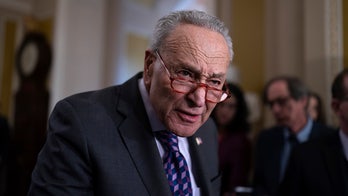WASHINGTON – President Obama on Friday plans to nominate President George W. Bush's former No. 2 at the Justice Department, Jim Comey, to lead the FBI as the bureau grapples with privacy debates over a host of recently exposed investigative tactics.
If confirmed by the Senate, Comey would serve a 10-year tenure and replace Robert Mueller, who has held the job since the week before the terrorist attacks on Sept. 11, 2001. Mueller is set to resign on Sept. 4 after overseeing the bureau's transformation into one the country's chief weapons against terrorism.
The White House said in a statement that Obama would announce his choice of Comey on Friday afternoon.
Comey was a federal prosecutor who severed for several years as the U.S. attorney for the Southern District of New York before coming to Washington after the Sept. 11 attacks as deputy attorney general. In recent years he's been an executive at defense company Lockheed Martin, general counsel to a hedge fund, board member at HSBC Holdings and lecturer on national security law at Columbia Law School.
The White House may hope that Comey's Republican background and strong credentials will help him through Senate confirmation at a time when some of Obama's nominees have been facing tough battles. Republicans have said they see no major obstacles to his confirmation, although he is certain to face tough questions about his hedge fund work, his ties to Wall Street as well as how he would handle current, high-profile FBI investigations.
The FBI is responsible for both intelligence and law enforcement with more than 36,000 employees. It has faced questions in recent weeks over media leak probes involving The Associated Press and Fox News; the Boston Marathon bombings; the attack at Benghazi, Libya, that killed four Americans; and two vast government surveillance programs into phone records and online communications.
The leaker of those National Security Agency programs, former NSA contractor Edward Snowden, also is the subject of an ongoing criminal investigation. And just this week Mueller revealed the FBI uses drones for surveillance of stationary subjects and said the privacy implications of such operations are worthy of debate.




